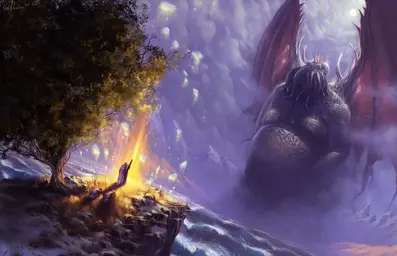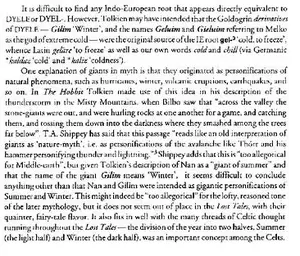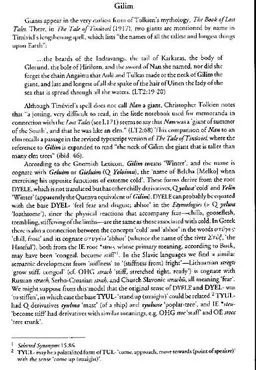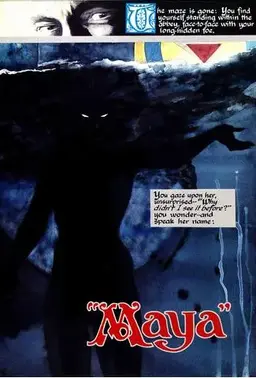Piadinha: no meu ensaio sobre a Ungoliant comparei Ungoliant com outros seres primevos mitológicos que incorporavam o Caos do começo das cosmogonias.
Ungoliant, Dualismo e Livre-Arbítrio nos Mitos de Tolkien
Ymir ( acrescente-se tb Jormungand) na nórdica
Apep na egípcia( acrescentando aqui)
Tífon na grega
Tiamat na sumérico-babilônica.
Raab e Leviatã bíblicos
Afanc na mitologia céltica de Gales e Domnu na Irlanda( adicionados aqui)
O lance é que, supõe-se que, etimologicamente, o termo Tiamat esteja ligado ao hebreu "tehom", "abismo", que aparece na Bíblia.
Agora vem o curioso: um dos termos mais comuns pra "abismo" em sânscrito é justamente...
"arana", आरण AraNa n. abyss
E araña é a forma castelhana de se escrever "aranha" e Tolkien CONHECIA a língua bem o bastante pra funcionar de intérprete na visita de meninos espanhóis na Inglaterra, até porque seu tutor, que era o padre Francis Morgan, era espanhol.
Daí eu suspeito que o trocadilho foi irresistível para Tolkien.
E, como nós "sabemos" que ele
"não tinha" "NENHUMA repulsa especial por aranhas"  ...
...
Comparem as frases lapidares de Tolkien a respeito do assunto:
"And I do not dislike spiders particulary and have no urge to kill them" com "but I developed a dislike for his Tarzan even greater than my distaste for spiders"
Que "distaste" Tolkien? Aquele MESMO que vc disse que não tinha em outra carta de dez ou doze anos antes?

Ahhhhh, AQUELE "distaste" que, agora, é menor que sua aversão por Tarzan mas, que, pelo contexto, deve ser BEM GRANDE, mesmo assim?
Ademais, outra anedota: outra dia, Tar-Mairon teceu uma comparação que nunca havia me ocorrido com essa claridade: Ungoliant e Kali.
Daí, quando ele falou isso, dessa vez, eu me recordei de que
o sentido de Kali em sânscrito é a "negra" com a acepção de atemporal e que esse era exatamente o sentido de um dos nomes do Outer Dark, da Noite Primeva que Tolkien também chamou Timeless Void ( Vazio sem Tempo) no The Book of Lost Tales. Lá se dizia que Ungwëliante era "Gwerlum, uma encarnação de
Móru, a Noite Primeva", significando, literalmente...
a Negra.
Kālī is the feminine form of kālam ("black, dark coloured").[3] Kāla primarily means "time" but also means "black" in honor of being the first creation before light itself. Kālī means "the black one" and refers to her being the entity of "time" or "beyond time." Kāli is strongly associated with Shiva, and Shaivas derive the masculine Kāla (an epithet of Shiva) to come from her feminine name. A nineteenth-century Sanskrit dictionary, the Shabdakalpadrum, states: कालः शिवः । तस्य पत्नीति - काली । kālaḥ śivaḥ । tasya patnīti kālī - "Shiva is Kāla, thus, his consort is Kāli" referring to Devi Parvathi being a manifestation of Devi MahaKali.
Other names include Kālarātri ("black night"), as described above, and Kālikā ("relating to time"). Coburn notes that the name Kālī can be used as a proper name, or as a description of color.[4]
Uma última historinha:
comparem essa história mitologica nórdica onde Odin roubou o mulso da sabedoria, ajudado por uma gigante da escarcha, filha do ladrão da beberagem da sabedoria,Suttungr, chamada
Gunnlöd, com a história de Melkor, recorrendo à Ungoliant pra matar as árvores de Valinor e roubar os Silmarils.
Na história nórdica tudo por causa de...
s-e-x-o. Três noites "daquilonaquilo" com o Onipotente Safado, como diziam os editores da Marvel na Editora Abril dos oitenta...Eitâ, "Buraco Negro" sequioso, sô...
 Vejam se essa "sede" e "secura", paradoxalmente, não estão nesses olhinhos de "Pícara Sonhadora", na pintura acima, azulálgidos, "impregnados de distância", como dizia o Lewis...
Vejam se essa "sede" e "secura", paradoxalmente, não estão nesses olhinhos de "Pícara Sonhadora", na pintura acima, azulálgidos, "impregnados de distância", como dizia o Lewis...
Agora, olhem bem pro nome "Gunnlöd" e, reparem que ele é quase um anagrama perfeito de ... "ungol", a versão sindarin do quenya "ungwë", aranha...
Tolkien, the terrible, strikes again...

A história de como o pai dela, Suttungr, se vingou dos dois anões, Fjalar e Galar, que haviam matado o pai dele, Gilling, extorquindo deles o segredo do hidromel, é, claramente, o protótipo pra parte da história do Ouro do Reno de Wagner *que conta a a origem do fatídico Anel do Nibelungo, onde os anões, provavelmente, serviram de inspiração pro nome dos gigantes aliterando, Fafner e Fasolt, e onde Alberich, um anão ( nibelungo) roubou o ouro do Reno das ninfas guardiãs do rio ( o papel de guardiã é desempenhado pela própria Gunnlod ( que significa "convite da Batalha").
E o que é que Melkor soltou quando Ungoliant tentou comê-lo com Silmarils e tudo?
Talvez um "gunnlöd" pra seus balrogs, estranhamente parecido com o grito de uma menininha histérica?
'"Irmãos com nomes aliterados" que o ofenderam antes? Algo tipo Húrin e Huor?. Huuummmm...Confrontação com gigantes... a imagem do mar submergindo uma rocha que foi a armadilha na qual Suttungr colocou Fjalar e Galar e seus companheiros anões...
Comparar com:
Then all the hosts of Angband swarmed against them, and they bridged the stream with their dead, and encircled the remnant of Hithlum as a gathering tide about a rock. There, as the Sun westered and the shadows of the Ered Wethrin grew dark, Huor fell pierced with a venomed arrow in the eye, and all the valiant men of Hador were slain about him in a heap; and the Orcs hewed their heads and piled them as a mound of gold in the sunset.
Last of all Hurin stood alone. Then he cast aside his shield, and seized the axe of an orc-captain and wielded it two-handed; and it is sung that the axe smoked in the black blood of the troll-guard of Gothmog until it withered, and each time that he slew Hurin cried aloud: 'Aure entuluva!Day shall come again!' Seventy times he uttered that cry; but they took him at last alive, by the command of Morgoth, who thought thus to do him more evil than by death. Therefore the Orcs grappled Hurin with their hands, which clung to him still, though he hewed off their arms; and ever their numbers were renewed, till he fell buried beneath them. Then Gothmog bound him and dragged him to Angband with mockery.
Mythology
Suttungr searched for his parents and threatened the dwarven brothers Fjalar and Galar, tying them and some other dwarves who killed Gilling to a rock that would be submerged by the rising tide.
E, pra completar, o nome Gilling foi aproveitado por Tolkien pra batizar...
o próprio Melkor que era também chamado Gielluin ou Gilim, significando "inverno", também o nome de um gigante no Contos Perdidos, simbolizando o Melkor como personificação hibernal.
Significado nórdico original dos culpados na história
Varg Vikernes "Guide To The Norse Gods And Their Names"




 ?
?



 ...
...








 !
!